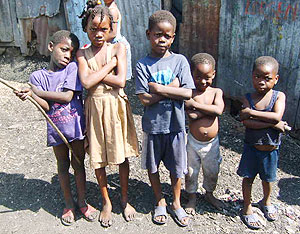For children, the streets of Port-au-Prince are some of the most dangerous in the world. Even before the earthquake, kidnap gangs were estimated to take thousands of children from the slums and streets of the Haitian capital every year. But the quake has made the situation even worse. Now there are thousands of new orphans, and thousands more children separated from their families.


For children, the streets of Port-au-Prince are some of the most dangerous in the world.
Even before the earthquake, kidnap gangs were estimated to take thousands of children from the slums and streets of the Haitian capital every year.
But the quake has made the situation even worse. Now there are thousands of new orphans, and thousands more children separated from their families.
For days rumours swirled of children being picked off the streets and whisked out of the country.
‘No documentation’
But on Saturday afternoon I suddenly stumbled into the middle of a case that is now grabbing headlines around the world.
In the front office of the child protection police at Port-au-Prince airport I found 33 tiny children crammed on to benches and tables.
I had no idea who they were or where they had come from.
But it soon became apparent that something very strange was going on. The policeman on the door told me there were white people inside, Americans, and they were trying to smuggle the children out of the country.
The rumour mill turns fast in Haiti, and soon a dozen local journalists were turning up.
Then - as we all scrambled forward with our microphones outstretched - a prosecutor came out to talk to us.
"These people were caught while on their way to the border with 33 children,” he said. "They had no documentation on them at all, and no proof that these children are orphans.”
‘Legitimate orphanage’
But who were the white people inside the police station? No-one could tell us.
Then - as they were being taken to the back of the station - one of them, a middle-aged woman, managed to slip us a piece of paper.
On it was written her name, Laura Silsby, and the name of her organisation - The New Life Refuge, a Christian group from Idaho.
Late on Saturday night she was allowed out to speak to the media.
"In the time frame that they were with us the team deeply fell in love with the children,” she said.
"They are very precious kids that have lost their homes and their families, and are so, so in need of God’s love and compassion and a very nurturing setting.”
Ms Silsby said the group had received the children from a legitimate orphanage in Haiti and did not realise that additional paperwork was needed to take them out of the country.
New twist
Well-intentioned but misguided then. They wanted the best for the kids, but had taken a few short cuts.
But international law is very clear - taking children and trying to cross an international border without permission or documentation is child smuggling, regardless of your intentions.
"You can’t just go and take a child out of a country - no matter what country you are in,” said Kent Page, a spokesman for Unicef in Haiti.
"There are processes that have to be followed. You can’t just pick up a child and walk out of a country with a child, no matter what your best intentions are,” he added.
And then - as Sunday wore on - a new development.
The orphanage in Port-au-Prince that is now looking after the 33 children has been talking to them, and it appears that not all of them are even orphans.
George Willeit, a spokesman for the Austrian-run orphanage, said they had talked to one little girl and she told them that she had parents.
"We talked to the little girl, maybe nine,” Mr Willeit said.
"And she told us, crying, that she does have parents. She says she thought she was being sent to boarding school or to summer camp.”
BBC


